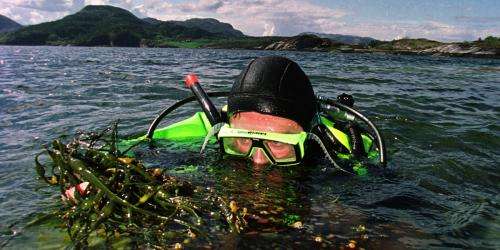Turning humble seaweed into biofuel

The sea has long been a source of Norway's riches, whether from cod, farmed salmon or oil. Now one researcher from the Norwegian University of Science and Technology (NTNU) researcher hopes to add seaweed to this list as he refines a way to produce "biocrude" from common kelp.
"What we are trying to do is to mimic natural processes to produce oil," said Khanh-Quang Tran, an associate professor in NTNU's Department of Energy and Process Engineering. "However, while petroleum oil is produced naturally on a geologic time scale, we can do it in minutes."
Tran conducted preliminary studies using sugar kelp (Laminaria saccharina), which grows naturally along the Norwegian coast. His results have been published in the academic journal Algal Research.
The breakthrough
Using small quartz tube "reactors" – which look like tiny sealed straws – Tran heated the reactor containing a slurry made from the kelp biomass and water to 350 degrees C at a very high rate of 585 degrees C per minute.
The technique, called fast hydrothermal liquefaction, gave him a bio-oil yield of 79%. That means that 79 % of the kelp biomass in the reactors was converted to bio-oil. A similar study in the UK using the same species of kelp yielded just 19%. The secret, Tran said, is the rapid heating.
Falling short on biofuel production
Biofuel has long been seen as a promising way to help shift humankind towards a more sustainable and climate friendly lifestyle. The logic is simple: petroleum-like fuels made from crops or substances take up CO2 as they grow and release that same CO2 when they are burned, so they are essentially carbon-neutral.
In its report "Tracking Clean Energy Progress 2014", the International Energy Agency (IEA) says that biofuel production worldwide was 113 billion litres in 2013, and could reach 140 billion litres by 2018.
That may sound like a lot – but the IEA says biofuel production will need to grow 22-fold by 2025 to produce the amount of biofuel the world will need to keep global temperatures from rising more than 2oC.
The problem is the biomass feedstock. It's relatively easy to turn corn or sugar beets into ethanol that we can pump right into our petrol tanks. But using food biomass for fuel is more and more problematic as the world's population climbs towards 8 billion and beyond.
To get around this problem, biofuel is now produced from non-food biomass including agricultural residues, land-based energy crops such as fast-growing trees and grasses, and aquatic crops such as seaweed and microalgae.
All of these feedstocks have their challenges, especially those that are land based. At least part of the issue is the fact that crops for biofuel could potentially displace crops for food.
However, seaweed offers all of the advantages of a biofuel feedstock with the additional benefit of growing, not surprisingly, in the sea.
Scaling up
But turning big pieces of slippery, salty kelp into biocrude is a challenge, too. Some studies have used catalysts, which are added chemicals that can help make the process go more quickly or easily. However, catalysts are normally expensive and require catalyst recovery.
The UK study that resulted in a 19% yield used a catalyst in its process.
Tran says the advantage of his process is that it is relatively simple and does not need a catalyst. The high heating rate also results in a biocrude that has molecular properties that will make it easier to refine.
But Tran's experiments were what are called screening tests. He worked with batch reactors that were small and not suitable for an industrial scale. "When you want to scale up the process you have to work with a flow reactor," or a reactor with a continuous flow of reactants and products, he said. "I already have a very good idea for such a reactor."
The outlook
Even though the preliminary tests gave a yield of 79%, Tran believes he can improve the results even more. He's now looking for industrial partners and additional funding to continue his research.
More information: "Fast hydrothermal liquefaction of a Norwegian macro-alga: Screening tests." Quang-Vu Bach, Miguel Valcuende Sillero, Khanh-Quang Tran, Jorunn Skjermo. DOI: 10.1016/j.algal.2014.05.009
Journal information: Algal Research
Provided by Norwegian University of Science and Technology




















